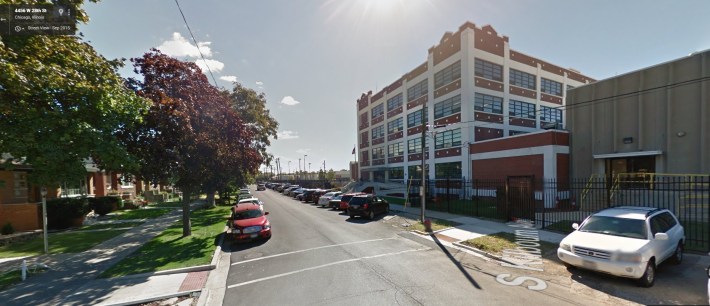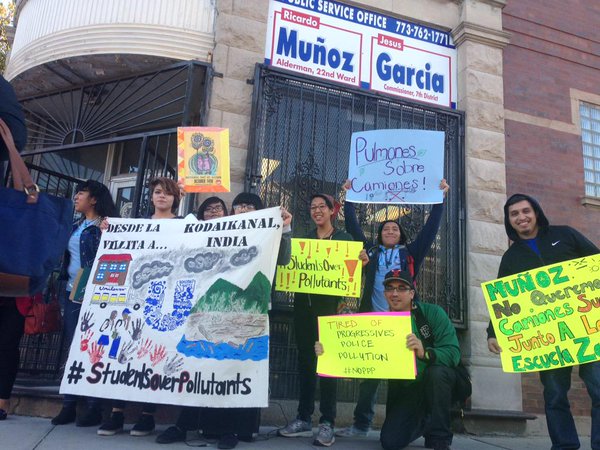In 2011, the Little Village Environmental Justice Organization gained notoriety for its successful campaign against two coal-fired power plants owned by Midwest Generation, which were then operating in Little Village and Pilsen. A Harvard study had linked more than 40 premature deaths, 550 emergency room visits, and 2,800 asthma attacks every year to the toxic emissions from the two plants. Faced with mounting public pressure, the coal power plants finally closed in the fall 2012. More recently, LVEJO has been part of the ongoing campaign to restore full-service to the 31st Street bus route.
Little Village now faces another environmental challenge tied to Unilever’s expansion of a new Hellman’s mayonnaise factory and distribution center on a vacant site near 28th Street and Kilbourn Avenue. Other notable Unilever brands are Ben & Jerry’s, Dove, and Lipton.
Leaders with LVEJO are worried about the diesel exhaust from trucks passing through the neighborhood and the potential health and safety risks that this traffic poses for Little Village residents. Diesel exhaust contains particles that can cause damage to organs and increase the chances of respiratory disease and lung cancer. LVEJO is also concerned that more truck trips could lead to more pedestrian crashes.
According to Nancy Meza, community organizer at LVEJO, an estimated 500-900 additional trucks will be coming into Little Village daily due to the expansion. “We were able to close down these power plants [Fisk and Crawford], but now we have a new concern with the diesel trucks,” says Meza.
In order to spur conversation and raise awareness about diesel exhaust, LVEJO has been conducting diesel 101 workshops throughout the neighborhood at churches and town halls. Wanting to gather further information about the number of trucks coming and going from Little Village, LVEJO has also started to conduct “truck counts” at various points throughout the neighborhood.
An AP statistics class at Little Village Lawndale High School (located near the site at 31st and Kostner) partnered with LVEJO to conduct one of these truck counts throughout the course of a month. The class counted trucks for a time span of 5 hours and 45 minutes in that month and recorded 552 trucks, averaging 1 truck per minute. A few weeks ago, students at Instituto Justice & Leadership Academy also conducted truck counting at Western Avenue and 26th Street.

In addition to the truck counts by local high school students, LVEJO is conducting truck counting at intersections they dub part of the “dirty diesel routes,” which includes 31st and California Avenue, 31st and Pulaski Road, and the Ogden Avenue corridor. Truck counting at these intersections are happening two days a week for 15 minute intervals in the morning and afternoon.
LVEJO recently received a grant from the U.S. Environmental Protection Agency in partnership with Kansas State University to conduct further research regarding air quality in Little Village. The study will also be looking at Altgeld Gardens and the South Loop and will be measuring air quality while residents are walking, in addition to stationary air quality in homes. LVEJO plans to start their pilot in April.
Meza says we need to think critically about the ways transportation, the environment, and safety issues intersect in communities.
“I don’t think when the mayor talks about improving transportation, he is looking at Little Village or the impact of diesel trucks,” she says. Meza sees a connection between proliferation of trucks and an increase in pedestrian crashes, such as the case of an Amazon truck fatally striking an 84-year old woman in Little Village late December 2016.
Meza says LVEJO isn’t against Unilever’s expansion into Little Village. They simply want to make sure environmental impacts are taken into consideration, in addition to providing good jobs for residents.
“Little Village has been known as industrial for over 100 years because of its location,” she says. “These companies promise jobs. We do want jobs, but we also want to make sure they aren’t temp, but full-time with benefits.”
LVEJO was able to meet with Unilever representatives a few weeks ago and they brought up their concerns about air quality. “They seem willing to convert their [truck] fleet. Ideally, we would like electric-powered trucks, but even a move from diesel to natural gas would be a step in the right direction,” Meza says.
Unilever’s current facility and expansion is just blocks away from Zapata Elementary School in Little Village and Unilever has donated three acres of land to aid in the school’s expansion, according to Meza.
“We are willing to work with the alderman [Ricardo Munoz of the 22nd Ward] and Unilever to ensure a safe expansion and good jobs for Little Village,” Meza says.
Did you appreciate this post? Consider making a donation through our PublicGood site.




